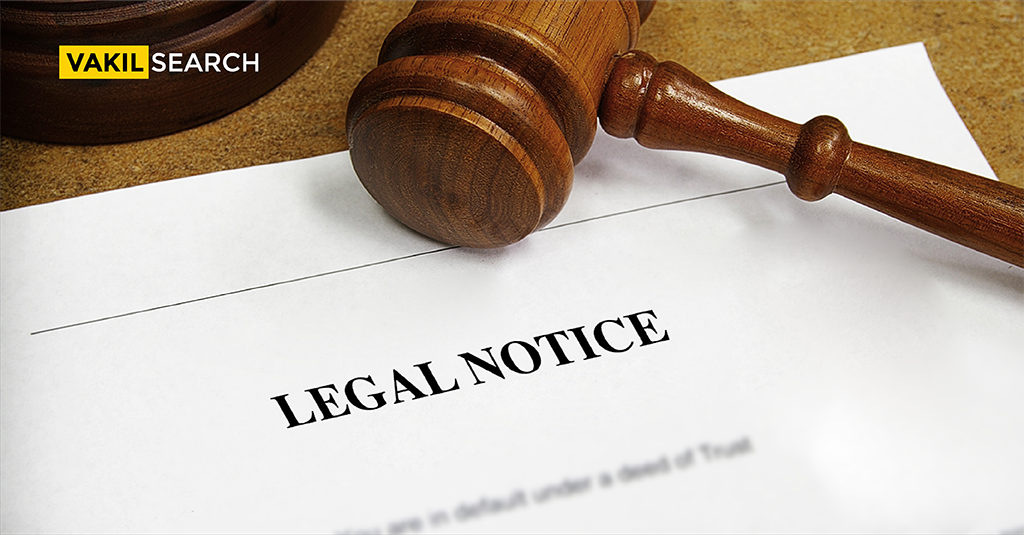There is a common mistake about legal summon, as most people cannot define what goes into them. While it’s always advisable to get a legal expert to create one out. You will also get to know what goes into drafting one.
What is Legal Notice?
All legal action can only be taken once notice has been served upon the entity or individual you wish to take to court. It is this process that legalisms bringing a matter to court. The intimation sent is known as a legal document. A Legal Notice is, therefore, a formal communication to a person or an entity, informing the other party of your intention to undertake legal proceedings against them.
This notice, when sent, conveys your intention before the legal proceedings and thus, makes the party aware of your grievance. Many times, a legal summon served will bring the other party to heel, and the problem is often resolved out of court, well before it goes to trial, with fruitful discussions on both sides.
However, if the other party is still unheeding the grievance, one can always start the court proceedings after the prescribed interval as stated by law. The bottom line is that it can serve as a point of reference to embark upon negotiations between two parties and save both the time, effort, and money that is usually spent in court cases.
Essential Information
A legal summon is filed as per Section 80 of the Code of Civil Procedure, 1908, and is only filed in civil cases. A legal document is an intimation and thus carries the following information:
- Precise statement and facts relating to the grievance for which the action is to be taken
- Alternatives/relief sought by the grieving party
- A summary of facts, and
- The way it can be solved.
A complete brief of the problems that the aggrieved party is facing, combined with what can be done to resolve the issue need to be clearly mentioned. The last part of the Legal should contain a detailed account of how relief can be obtained and/or the problem can be solved once the grievance is mutually agreed upon by both sides.
A perfectly crafted legal summon can act as a mediator between the two parties and help solve the issue out of the court if both of them are willing to compromise on the issue.
Notice must contain the following points:
- Name and required information
- Description
- Place of residence of the notice sender
- Aspects of the effect
- The form of relief claimed by the sender of the notice
- The gist of the legal basis for the relief claimed
Filing a Legal Document
A legal document, requires precision and accuracy and the use of definite language to ensure the message sent across is correct. A legal expert or an agent can help in putting forth the legal formate as per law and wording it as required for the particular issue.
Is Serving Legal Summon Mandatory?
Legal matters can be confusing, but one question many people ask is whether sending a legal summon is really needed. The answer is yes! Serving a legal summon is a crucial step in many legal situations. It’s like giving a warning signal before taking further legal action.
Let’s dive into this topic and shed light on why legal summon are so important.
A Demo About Legal Summon
Here’s a legal summon with a demo –
Imagine you’ve lent money to a friend, and they’re not paying you back. In this situation, you might want to take legal action to get your money back. But before going to court, you can send a legal summon.
It’s like saying, “Hey, I’m serious about this matter, and if we can’t resolve it, I might go to court.” This notice serves as a chance for the other party to respond and resolve the issue without involving the courts.
Best Practices on Sending Legal Summon
If you find yourself in a situation where you need to send a legal summon, there are some things you should keep in mind.
- First, be clear and concise in your notice
- Use simple language and avoid complex jargon
- Clearly state the problem and the action you expect the other party to take.
- Keep your tone professional and focused
- Additionally, it’s a good idea to send the notice through a registered post. This way, you have proof that the notice was delivered
At Vakilsearch, we’re not just about legal jargon; we’re about simplifying the legal process for you.
Similar to how legal summon act as a bridge to resolution, our services bridge the gap between complex legal procedures and everyday individuals. With our expertise, you can navigate legal matters with confidence.
Whether it’s sending or responding to legal summon, we’ve got you covered!
Legal Summon Format
A legal summon follows a specific format. It typically starts with the sender’s name and address, followed by the receiver’s name and address. The subject line should clearly state that it’s a legal summon.
The body of the notice explains the issue, the facts surrounding it, and the action you expect from the receiver. Finally, the notice should end with your name, designation (if applicable), and contact information.
How are Court Summons Delivered in India?
Personal Service by Court Officer:
The court issues summons to the defendant personally or through his agent. The court’s officer delivers the summons to the defendant in person or to his agent. In the absence of the defendant at his residence, the summons is served to an adult member of his family.
Service Through Courier Services (R.P.A.D. Service):
The High Court establishes rules for service through Registered Postal Acknowledgment Due (R.P.A.D.), Speed Post, or courier services. This is in addition to direct service by the court.
Service by Plaintiff (By Hand Service):
The court may allow the service of summons through the plaintiff upon application. This mode is valid, and the rules of direct service by the court apply to this method.
Substituted Service:
When the court is satisfied that the defendant is avoiding service in the ordinary way, it may employ substituted service by:
- Affixing a copy of the summons to a conspicuous part of the courthouse.
- Affixing a copy of the summons to a conspicuous part of the defendant’s house.
- Advertising in a local newspaper where the defendant ordinarily resides, carries on business or works for personal gain.
Service Through Electronic Message:
Service of summons can be made through electronic media such as emails or fax for expediency and speedy delivery. Rules prescribed by the High Court govern this mode of service.
Service in Special Cases:
Special provisions for service of summons in specific cases are covered under Order 5 Rule 21-30, Section 28, Order 29 Rule 2, and Order 30 Rule 3 of the Civil Procedure Code (C.P.C.).
What happens if you get summoned to court and don’t go?
If you receive a summons to court and fail to appear without proper justification, several consequences may follow:
Contempt of Court:
Non-appearance can be viewed as contempt of court. Contempt of court involves disobedience or disregard of the court’s authority, and the court may take action against the individual for this violation.
Issuance of Warrant:
The court may issue a warrant for your arrest if you do not appear as summoned. This warrant authorizes law enforcement to apprehend you and bring you before the court.
Fines or Penalties:
Courts have the authority to impose fines or penalties for non-compliance with a summons. The severity of these consequences may vary based on the nature of the case and the discretion of the court.
Compulsory Appearance:
Courts may compel your appearance by force, including arrest, to ensure your compliance with the legal process.
Additional Legal Consequences:
Failure to appear can lead to unfavourable legal judgments or decisions being made in your absence. This may negatively impact the outcome of your case.
Bench Warrant:
A bench warrant may be issued, leading to your arrest if you come into contact with law enforcement for any reason.
It is crucial to communicate any valid reasons for non-appearance to the court as soon as possible. If you are unable to attend, notifying the court in advance and seeking permission for an alternative arrangement may be essential to avoid more severe consequences. Ignoring a court summons can escalate legal issues and result in significant repercussions.
Types of summons
Civil Summons:
A specific classification which refers to a summons issued by a civil court, typically for settling disputes between citizens. Informs the defendant about a civil action and requires their appearance in court. Common in cases involving damages, compensation, or injunctions.
Criminal Summons:
Connected with criminal acts and legal procedures against an individual. Different jurisdictions may have various types of criminal summons. This type of summons requires an individual to appear in criminal court. Usually issued by law enforcement or prosecutors in criminal proceedings.
Administrative Summons:
Issued by regulatory bodies with legal authority to handle specific investigations or issues. For example, tax authorities issue summons for tax-related matters.
Court Summons (Summons from Court):
A general term referring to any summons issued by a court, requesting an individual’s appearance.
Administrative Summons:
Issued by administrative courts dealing with specific legal issues, such as immigration or environmental matters.
Traffic Summons:
Issued for violations of traffic rules by law enforcement, typically traffic police. Failure to respond may result in legal consequences.
Police Summons (Registered FIR):
Police have the authority to issue a summons for criminal activities, public violations, or traffic offenses after registering an FIR.
It’s important to respond to all types of summons promptly and appropriately, as failure to do so may lead to legal consequences, including contempt of court, fines, or arrest. Each type of summons serves a specific purpose within the legal framework.
Procedure for Legal Notice\Summon
- The first step is to prepare a Legal Notice\Summon, with the issue, the relief sought, and a definite time frame (say, 30 to 60 days) to solve the issue, to be addressed to the other party and sent through registered AD post
- After sending the Legal Notice\Summon, save a copy of the receipt sent. This may come in handy in case of filing for the court case
- Wait for the stipulated period before filing the court case
- Now, the person or entity on whom the Legal Notice\Summon was served will have the above-mentioned days to reply to the notice or opt for an out-of-court settlement.
Even if the other party were to ignore a Legal Notice\Summon, it is essential for the aggrieved party to open up grievances through the medium of legal formate. If the other party were not to reply to a notice, they are likely to be at a disadvantage when appearing in court.
The legal draft can be sent personally too. One can write a legal summon and authorize it before sending it to the other party. However, since wording and legal format is extremely important if the case reaches court, and citing the law under which you have raised the claim is essential, having a legal expert prepare your legal summon will work to your advantage.
The same applies to replying to a Legal summon too, since here too one may not know the appropriate law to be used to respond to the claims demanded by the other party.
FAQs about Legal Notice\Summon
Yes, you can refuse a legal summon, but it's not the best move. If you ignore a legal summon, the sender might take further legal action against you. It's better to respond to the notice and try to resolve the matter amicably.
If you don't reply to a legal summon, the sender might go ahead and file a case in court. This can lead to legal complications and might not be in your best interest.
After receiving a legal summon, you should assess the situation. If the claims are legitimate, consider responding and trying to resolve the matter outside of court. If the claims are baseless, you can send a reply stating your stance and providing evidence to support it. Can I refuse legal summon?
What happens if I don't reply to a legal summon?
What is the next step after legal summon?
Also, Read:









